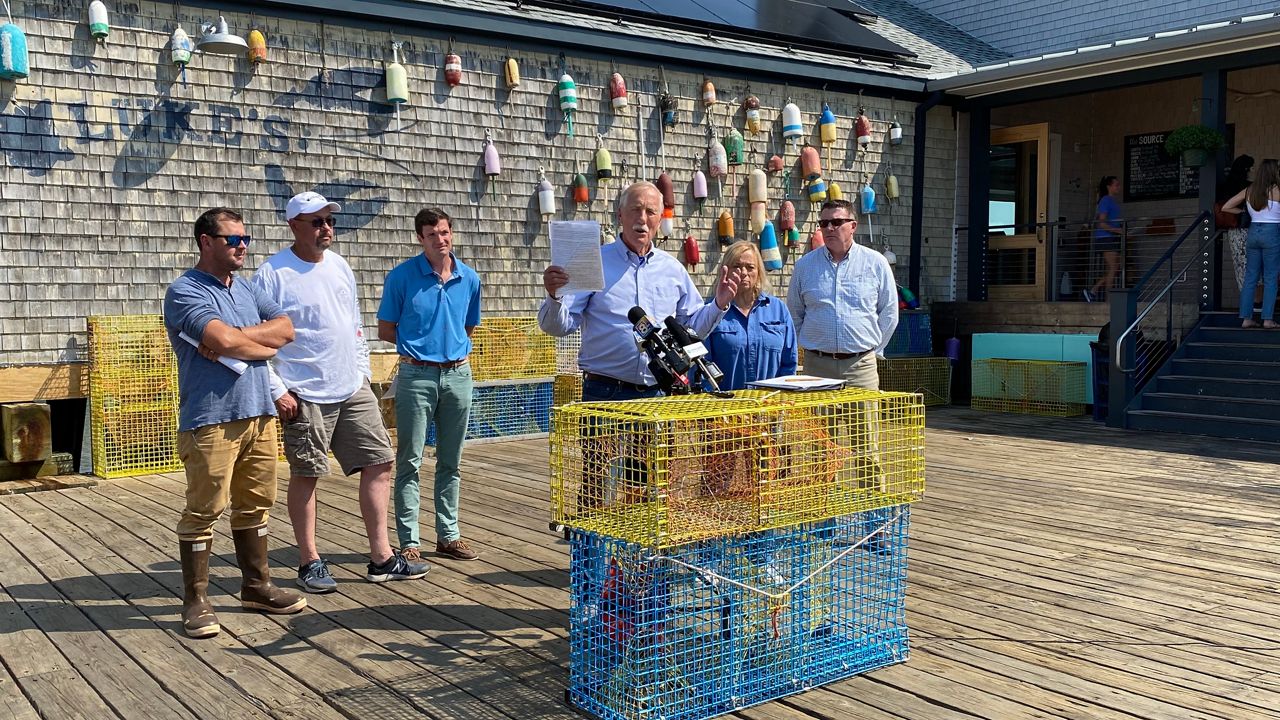Maine lawmakers took a strong stand this week against groups and corporations targeting the lobster industry, urging Mainers to “refuse to patronize” those that have phased out lobster sales because of concerns about endangered right whales.
The Maine House and Senate passed a joint resolution Wednesday calling out Whole Foods Market and food delivery services Blue Apron and HelloFresh for “following misguided recommendations rather than science.”
On Friday evening, a Blue Apron spokesman told Spectrum News that the company did not discontinue Maine lobster sales because of concerns about endangered whales, but rather because it was offered only seasonally. However, the company does use certifications to determine what products they offer and it's unclear whether they will buy Maine lobster in the future.
"As we monitor the sustainability of seafood, Blue Apron aims to source as sustainably as is reasonably possible," the company said in a statement. "This could mean sourcing from farms or fisheries with sustainability certifications from leading sustainability organizations, such as from Marine Stewardship Council, Aquaculture Stewardship Council or Best Aquaculture Practices or finding similar fisheries who are involved in fishery improvement projects."
The resolution came one day after Republicans announced they will introduce legislation to ban Whole Foods from participating in tax break programs and forbid the state from holding any contracts with Whole Foods.
Also, they plan to ask Maine Attorney General Aaron Frey to investigate the funding sources of the Marine Stewardship Council and Monterey Bay Seafood Watch to see who funds their groups.
The stewardship council in November said it will suspend the Maine lobster fisheries sustainability certificate this month because they don’t think federal laws are strong enough to protect the whales.
And earlier this year, Seafood Watch issued a red flag warning for Maine lobster, urging consumers not to buy it because of concerns about whale protections. There are fewer than 350 whales left, according to federal officials.
Last month, a Whole Foods spokesman told Spectrum News that the company “will pause purchasing” Maine lobster until the stewardship council lifts its suspension or when Seafood Watch changes its rating to yellow or green.
“These third-party verifications and ratings are critical to maintaining the integrity of our standards for all wild-caught seafood found in our seafood department,” the spokesman said in a statement.
Spokespeople for Whole Foods, HelloFresh and the stewardship council did not respond to a request for comment on the joint resolution that was provided to them by Spectrum News.
Maine has about 4,750 commercially licensed lobstermen and 1,085 student license holders, according to the Maine Lobstermen’s Association.
The fleet supports 12,000 “jobs on the water” and an additional 5,500 shoreside jobs through its supply chain.
Maine Lobstermen’s Association Director of Advancement Kevin Kelley said the association cannot comment specifically on the legislative resolution but that it will closely review all upcoming bills.
“The Maine Lobstermen’s Association appreciates every effort that helps highlight the fact that lobster is one of the most sustainable fisheries in the world due to the effective stewardship practices handed down through generations of lobstermen,” he said via email. “These include strict protections for both the lobster resource and right whales.”
Since the Seafood Watch red listing in September, Maine politicians of all stripes — Republicans, Democrats and independent Sen. Angus King — have come to the defense of the industry, blasting groups for what they see as conclusions based on bad science.
At a fall press conference, King said Seafood Watch is attempting to tell Mainers what they can and can’t do with the lobster fishery.
“The heart of the issue is they have made a decision which is a knife in the back of the lobster industry in Maine with no evidence,” King said.
Lobster industry officials say no lobster gear has ever been linked to a right whale death and that the last entanglement in Maine gear was in 2004. Through the years, the industry has taken steps such as weakening their ropes so they break more easily to help protect the whales.
In addition to the Republican-backed bill and resolution, Sen. Eloise Vitelli (D-Arrowsic) said in October she is sponsoring a bill to authorize the state to sue the federal government over federal regulation of the industry.
“It’s vital for Maine leaders to stand up and make sure we’re doing all we can to protect our hardworking lobstermen,” she said in a statement. “This bill makes our commitment loud and clear: We will fight for this heritage industry, come hell or high water. Everything is on the table.”



